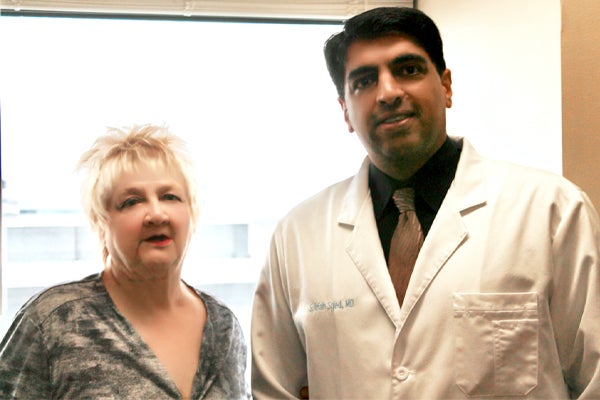This 69-year-old woman regained her independence with ETC at Ascension Chicago

Salahuddin Syed, MD, psychiatrist at Ascension Alexian Brothers Behavioral Health Hospital in Hoffman Estates, Illinois, treats patients with advanced depression with electroconvulsive therapy.
Rebecca Lo’gsdon from Hoffman Estates, IL, is a vibrant 69-year-old woman who radiates joy and strength today, although her journey to this point was not easy. She faced some of the toughest behavioral health diagnoses: bipolar disorder, severe depression, and years of feeling lost in a cycle of hospital stays and nursing homes. She describes herself back then as unrecognizable—both physically and emotionally. “I didn’t talk, I didn’t care how I looked,” she recalled. “If you saw pictures of me from four years ago, you wouldn’t believe it was the same person.”
Rebecca’s life began to change when she met Dr. Salahuddin Syed, a psychiatrist specializing in electroconvulsive therapy (ECT) at Ascension Illinois in Hoffman Estates. His compassionate care and treatment plan proved to be the key to her recovery.
What is electroconvulsive therapy?
ECT is a medical treatment used to address severe mental health conditions like depression, bipolar disorder, and some cases of psychosis. It works by sending a small, carefully controlled electrical pulse to the brain while the patient is under anesthesia. This pulse triggers a brief seizure, which helps reset the brain’s activity and promotes the release of growth factors that improve mood and cognition. Each treatment takes only a few minutes, and patients wake up shortly after.
Dr. Syed describes ECT as a “jumpstart for the brain,” and for patients like Rebecca, it’s been transformative. While it may sound complex, Rebecca explains her experience in simple terms, “It’s fast, and I don’t even remember most of it. I just know it’s what helped me feel better.”
ECT sessions helped treat her depression
When Rebecca began ECT, her sessions were frequent—three times a week. Over time, her treatments were spaced out as she improved. Today, she’s on ECT maintenance, visiting every few weeks to stay stable. Rebecca says she now feels stronger and more independent than she has in years.
“Before ECT, I wasn’t living—I was surviving,” she said. “Now, I feel like myself again. I have my personality back, my sense of humor, and my life.”
Thanks to ECT and minimal medication, Rebecca hasn’t been hospitalized in four years. She lives independently in an apartment with support from a local program and shares her life with Daisy, her beloved Shih Tzu emotional support dog. Rebecca has even found love, forming a meaningful relationship with her boyfriend, Brian.
The changes in Rebecca’s life go beyond mental health. Physically, she’s seen remarkable improvements. “I’ve lost 45 pounds, and I take care of my health now,” she said. “I look younger today than I did in my early sixties. That’s how much better I feel.”
Rebecca’s transformation is not just about avoiding hospitalizations. It’s about thriving. She cooks, spends time with friends, and embraces life fully. “I didn’t think I’d ever feel this way again,” she said. “But here I am, living my best life.”
Personalized behavioral health care
Rebecca attributes her recovery to the combination of expert medical care and the deeply personalized approach led by Dr. Syed. “Dr. Syed listens,” she shared. “He never gave up on me, even when I was at my worst. He told me, ‘You’re a great person, and don’t let anyone tell you otherwise.’ That meant everything.” His compassionate care built a foundation of trust that allowed Rebecca to fully engage in her treatment.
While ECT was an important part of her treatment, it was just one piece of a carefully crafted plan. Dr. Syed reevaluated her treatment holistically, reducing her medications to only two. This change simplified Rebecca’s routine, minimizing side effects and helping her regain a sense of autonomy in managing her health.
More than that, Dr. Syed encouraged Rebecca to reconnect with herself and others, providing emotional support that extended beyond the clinical setting. He guided her toward rebuilding relationships, finding joy in daily life, and addressing long-held trauma that had compounded her struggles. This blend of ECT, empathy and empowerment allowed Rebecca to find her independence..
“I’m living proof that you can get better,” Rebecca said. “There’s no shame in getting treatment. ECT saved my life, and it can help others too.”
Ascension Alexian Brothers Behavioral Health Hospital supported Rebecca, and they can support you every step of the way. Get 24/7 access to behavioral health care by calling 855-383-2224.
Last updated: June 17, 2025